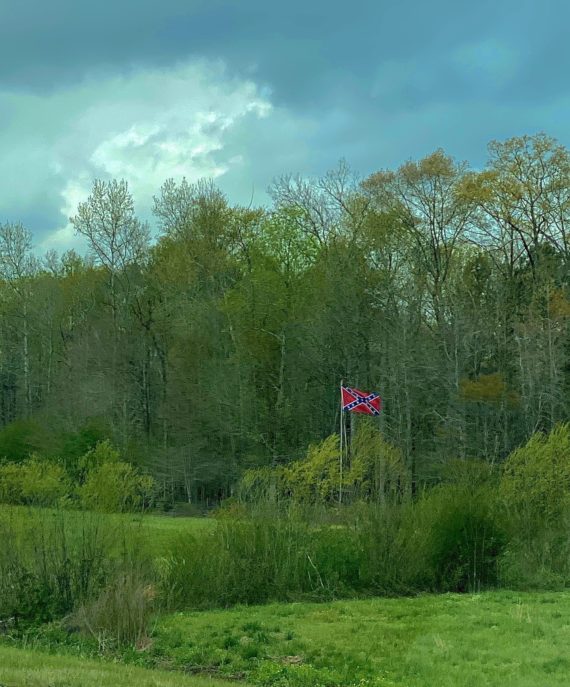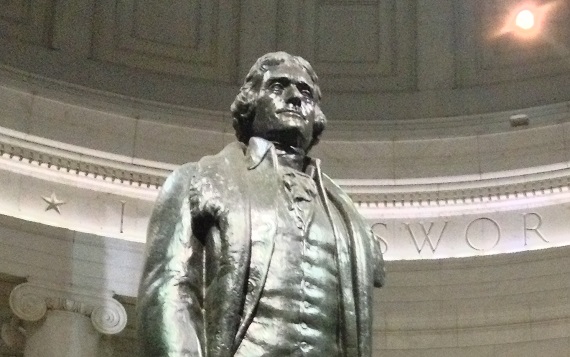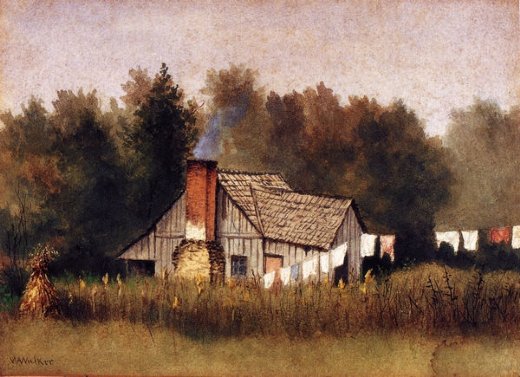
I recently wrote that “our South still exists, and not only in our own hearts; dotted throughout the former Confederacy lie pockets of that Edenic idyll our ancestors fought so bitterly to preserve.” On a spring drive from Columbia, South Carolina to Bentonville, Arkansas through Georgia, Alabama, and Mississippi, God intervened to show me just such a place.
As I entered Alabama, here and there our beloved flag began to appear, lifting my spirits each time I saw one billowing defiantly in the breeze. Aside from this, I have only seen Dixie fly with such frequency in the rural South Carolina community where my mother grew up and in rural Arkansas. As Alabama gave way to Mississippi, the storm clouds dissipated and their rains ceased. The sun shined brightly, revealing brilliant Alabama pines looming over the most verdant grass I have ever seen, the hills spotted with lush magenta redbud trees; a more magnificent spring scene I have yet to behold.
An eighteen-wheeler in front of us blew out one of its tires, and I swerved to avoid the massive piece of debris. I thought that I had succeeded, and did not feel anything strike my car. Apparently, I was mistaken, for when I exited the Interstate for gas almost two hours later and turned my music down, I heard an awful sound coming from underneath my car. With dread, I got out at the gas station and found that my mudguard was essentially torn off, hanging on by one out of four corners. I had dragged it for two hours, traveling in excess of eighty miles per hour. I inquired in the station, and the clerk recommended that I call a shop down the road. This particular shop only dealt in tires, and advised me to go to a mechanic just off of the next exit. I did so, and came to Potts Camp, Mississippi.
The mechanical shop flew two flags on its pole, the American and the Mississippian; as most of us know, Mississippi is the last state standing that is still proud of its Confederate heritage, with the flag of our Cause still unabashedly emblazoned on its state flag. The business owner noticed my Confederate monument bumper sticker, and I told him that I am a Life Member of the Sons of Confederate Veterans. He called his son over from underneath my car. His son, the man actually working on my car, introduced himself as a Mississippi State Senator! Neil Whaley represents Senate District 10. I told him about the tire debris that I thought had stricken me, and he said, “We call those Mississippi alligators.” Mr. Whaley, his father, and I conversed. I mentioned the efforts of the SCV South Carolina Division to strengthen the penalties against monument vandalism and grave desecration, and we lamented the ever-increasing attacks on our culture and our people. Unexpectedly, and to my delight, Mr. Whaley gave me a Mississippi flag that had flown over their State Capitol. My admiration for his wonderful state must have shown through.
The Whaleys graciously shared some of their family history with me. Their ancestor, Erasmus Potts, founded the town of Potts Camp. The community is a part of Marshall County, which has Holly Springs as its seat; Holly Springs was founded in 1836, on land that had only just been opened to settlement by the Chickasaw cession in the Treaty of Pontotoc Creek, negotiated under President Andrew Jackson. Holly Springs was the site of General Earl Van Dorn’s 1862 raid on the butcher Grant’s stores at the captured Confederate Armory Site. In 1836, Colonel Erasmus Potts of South Carolina traveled down the Pontotoc Trail to purchase land; Potts built a home and trading post on the Trail, near the Tippah River. Known far and wide for his hospitality, Potts opened his land to weary travelers and furnished them with equipment. The place began to be called Potts Camp.
Potts was a large plantation owner and cattleman, as well as a director of the Mississippi Central Railroad, which was to be destroyed during the War for Southern Independence. When the War erupted, Potts, being of advanced age, was unable to fight; he was, however, one of the wealthiest men in Mississippi, and used his fortune to contribute to our Cause, managing the Confederate supply chain in the area. When the Federals gained the upper hand in the region, they rampaged through the country, burning and pillaging in a reign of terror. Colonel Potts, legend has it, gathered his fortune, blindfolded two of his slaves and rode somewhere; after the slaves had buried his treasure, he blindfolded them once again as they left. This treasure has yet to be found.
Potts was arrested and convicted for his contributions to his nation, and imprisoned at the barbarically cruel Alton Military Prison in Alton, Illinois. Alton had the dubious distinction of being known as one of the most brutal of the Northern prisons; thousands of sons of the South were murdered or left to waste away from privation. The prison was kept at more than double its maximum capacity, with no regular water supply, horrific sanitation, and raging smallpox and rubella outbreaks. The elderly Potts could not stand the vicious conditions, and died there. Years later, the Whaleys told me, a group of Yankees brought Potts’ body back in a lead coffin, the only prisoner from Alton whose body was returned; evidently, the soldiers were looking for the man’s buried treasure. Potts’ wife identified his body only by the scar on one of his ears. The Federals then looted the Potts home down to the carpet on the floor, filling forty wagons. Potts’ wife later sued the United States government and won $2500 in gold, which of course was no recompense for what had been stolen. The Whaleys also showed me a photo of a beautiful quilt, with a story on the reverse side which Mr. Whaley’s grandfather had written. Another of their ancestors had been widowed by Federals during the War. While the butcher Grant’s unprincipled army of brigands raided her home, pilfering all of her family’s earthly possessions, one of their slaves stole away four quilts and hid them; the quilt is still with their family today, all of these years later.
Another customer walked into the shop, and the Whaleys introduced us. This man spends his free time digging for Confederate artifacts; he pores through the Official Records of the Union and Confederate Armies in the War of the Rebellion, the United States Department of War’s seventy-volume compilation of official records from both countries’ armies, and attempts to determine the physical location of Confederate campsites. He shared pictures of some of his finds with me, including artillery and belt buckles. Another man, an elderly gentleman, walked into the store, looked around as if searching for something and just as quickly walked back outside, opening the hood of his car. He fumbled around for a moment, then closed it and told us that earlier, he had been tinkering with his engine using a blade. He had driven away and realized that he didn’t have his knife. He was looking around because he thought he might have left it in the shop, and checked under his hood when he didn’t see it. Lo and behold, the still-open knife remained lodged in the engine! Yet another customer entered the shop, an officer with the Sheriff’s Department. We struck up a conversation with him, and he offhandedly mentioned an arrest made just the other day of a man who, apparently because he didn’t want neighbors, torched a brand new, three-hundred-thousand-dollar home.
Obviously, I was meant to meet these fine gentlemen on that fine spring drive. Kindred spirits do not meet merely by happenstance. Whenever our faith begins to waver, whenever we begin to let doubt creep into the corners, whenever we begin to ask ourselves whether the prospects for our Dixieland might indeed be dimming, even lost, we must remember the Whaleys of Potts Camp, Mississippi. In these communities across our Southron land, under relentless siege for at least two hundred years, the South lives yet. In our people excitedly sharing their family histories, in our Southern hospitality, and in our rich, bountiful earth, the South lives yet. I will hang my new Mississippi flag on the wall, next to my flags of Arkansas, the Confederacy, and South Carolina. What I appreciate even more than that flag, though, is the spiritual invigoration that the good people of Potts Camp imbued me with. The South is a fine place and worth fighting for. The South will survive, as it always has.






